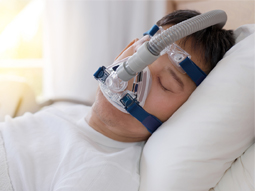Although many people experience occasional trouble sleeping, if the problem is severe or persistent, it may require medical attention. Sleep problems contribute to a variety of serious chronic health issues, such as diabetes, hypertension, and congestive heart failure.
Symptoms
Symptoms associated with sleep disorders include:
-
Excessive daytime sleepiness
-
Short-term or chronic insomnia (the inability to fall asleep or stay asleep)
-
Snoring or irregular breathing during sleep
-
Restless leg syndrome or other periodic limb movements
-
Unexplained or worsening heart failure or edema
-
Unexplained pulmonary hypertension
-
Difficulty in controlling hypertension
-
Sleep walking and other sleep disturbance behaviors
-
Frequent morning headaches
-
Depression
Diagnosis
Monitoring your sleep during an overnight sleep study is usually the only way to determine whether a sleeping disorder exists. A sleep study records functions of the lungs, heart, and other parts of the body. Testing is painless, risk-free, and usually takes one full night.
Test methods include:
-
Nocturnal Polysomnogram (NPSG) is an overnight sleep study that evaluates and records the patient's physical state during sleep periods. Each study lasts about nine hours, including time to prepare the monitors. Patients generally arrive two hours before their usual bedtime.
-
Multiple Sleep Latency Test (MSLT) is a daytime nap study to measure degree of daytime sleepiness. This test consists of a series of up to five naps during the day at two-hour intervals.
Disorders
It is estimated that between 50 and 70 million Americans suffer from serious chronic and intermittent sleep disorders that undermine their sleep quality and their health. Some of the more common include:
-
Insomnia: The complaint of an inability to fall asleep, stay asleep, or awaking too early. This may be caused by poor sleep habits, alcohol, medications, and stress.
-
Sleep Apnea: An obstruction of the upper airway that results in breathing pauses and sleep disruption. This is a serious and potentially life-threatening condition that causes people to stop breathing many times while they sleep. People suffering from sleep apnea are more likely to have a higher risk of hypertension and strokes, as well as car accidents due to excessive daytime sleepiness.
-
Narcolepsy: This ailment causes people to experience excessive daytime sleepiness and uncontrollable episodes of sleep. Narcolepsy is typically associated with sudden loss of muscle tone, vivid hallucinations occurring just before sleep, and the transient sensation of being paralyzed during the transition between sleep and wakefulness.
-
Periodic Limb Movement Disorder (PLMD): Periodic episodes of leg jerks or movements that disrupt sleep.
Treatments
Many times, lifestyle and behavior modifications can help patients with sleep-related disorders. These may involve dietary changes, weight-modification techniques, relaxation techniques, and other stress-reducers. When these are not effective, there are a number of non-surgical treatments that may be beneficial, including:
-
Oral Appliances: Oral appliances can be worn in the mouth at night to help quiet snoring and to treat mild cases of sleep apnea. If an oral device is right for you, you will first go through a sleep study and then be referred to a specially trained dentist for an examination and fitting.
-
Continuous Positive Airway Pressure (CPAP): CPAP is a method of delivering pressurized air through a nasal mask, which prevents the airway from closing during sleep. Air can then flow freely to and from the lungs. CPAP has a high success rate in treating obstructive sleep apnea, restoring normal sleep patterns, and eliminating daytime fatigue and sleepiness.
-
Bi-Level Positive Pressure: This procedure provides two different pressure levels for breathing in and out, and may be more comfortable for patients who have had difficulty tolerating CPAP.
-
Surgery: When a patient is unable to tolerate CPAP, a doctor may recommend surgery. Several surgical options can treat sleep-related breathing problems. Most surgeries make the airway larger by tightening or removing structures in the throat. Other procedures unblock the nose or reposition the jaw.
-
Pillar® Implants that stiffen the soft palate
-
Correction of a deviated septum or other nasal obstructions
-
Correction of obstructions in the throat and neck
-
Surgery to reduce the size of turbinates (structures inside the nose)
-
Surgery to correct a functional problem with the tongue that may be contributing to breathing problems during sleep
-
Removal of the uvula, the tonsils, and a section of the soft palate. This is the most common type of surgery for snoring and sleep apnea. This procedure often stops the throat structures from rattling, which causes snoring.
-
Transoral robotic surgery (TORS) or radiofrequency tissue ablation (RFTA) to shrink the back of the tongue or palate
-
-
Inspire device: Inspire is an alternative to CPAP that works inside your body while you sleep. It is an FDA approved obstructive sleep apnea treatment that works to treat the root cause of sleep apnea with just the click of a button. It’s a small device placed during a same-day, outpatient procedure. The device is offered at MedStar Georgetown University Hospital, MedStar Washington Hospital Center, and MedStar Health: Medical Center at Lafayette Square.
.
Our providers

Expert sleep care
Getting the care you need starts with seeing one of our sleep care specialists.









